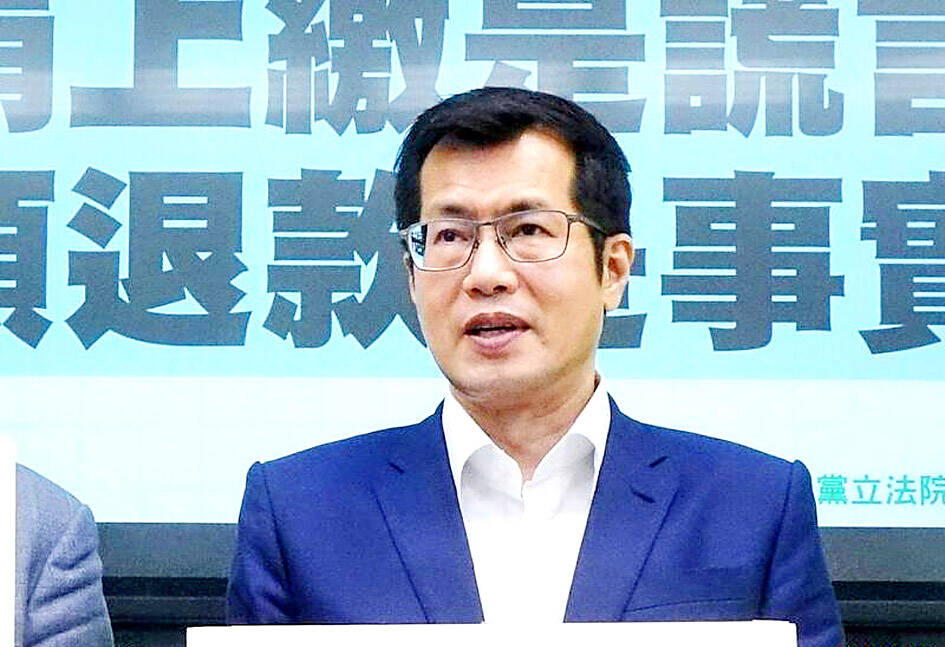The Cabinet supports investigating a deepfake video of a legislative candidate spread online as an attempt at election interference, Premier Chen Chien-jen (陳建仁) said yesterday.
Democratic Progressive Party (DPP) Legislator Lo Chih-cheng (羅致政) on Tuesday last week said he was a victim of a deepfake video being circulated online that featured his likeness in a sex act, and reported the incident to the Ministry of Justice Investigation Bureau.
He said the video was part of a Chinese attempt to influence Saturday’s presidential and legislative elections, in which he is seeking re-election.

Photo: Taipei Times file
The bureau on Monday said it would not release the results of its initial review of the video, as it does not disclose information on ongoing investigations.
During an extraordinary session at the Legislative Yuan yesterday, Chinese Nationalist Party (KMT) caucus whip William Tseng (曾銘宗) asked when the inspection results would be published.
The Executive Yuan hopes that investigators would find out the truth about the video as soon as possible, Chen said, adding that the Cabinet respects judicial independence.
Tseng said the government would be intervening in the elections if it did not publish the results of an investigation, an assertion Chen said he disagreed with, as investigations should be discreet.
KMT Legislator Lee De-wei (李德維) called for the results to be published.
“How could the case be proved to be an act of election intervention by China, as claimed by DPP presidential candidate Vice President William Lai (賴清德), if the results are not published?” Lee said.
Minister of Justice Tsai Ching-hsiang (蔡清祥) and Prosecutor-General Hsing Tai-chao (邢泰釗) have asked the Taipei District Prosecutors’ Office to “clarify, remove or trace the source” when disinformation emerges, he said.
Lo yesterday said the case was a new model for crimes carried out delicately, adding that “we must not let China’s cyberarmy have its way” in interfering in the elections.
He asked national security agencies to investigate election interference, which might involve China’s state-run media, pro-unification media and politicians from the pan-blue camp.
Additional reporting by Weng Yu-huang

A magnitude 4.9 earthquake struck off Tainan at 11:47am today, the Central Weather Administration (CWA) said. The hypocenter was 32.3km northeast of Tainan City Hall at a depth of 7.3km, CWA data showed. The intensity of the quake, which gauges the actual effect of a seismic event, measured 4 in Tainan and Chiayi County on Taiwan's seven-tier intensity scale, the data showed. The quake had an intensity of 3 in Chiayi City and County, and Yunlin County, while it was measured as 2 in Kaohsiung, Nantou County, Changhua County, Taitung County and offshore Penghu County, the data showed. There were no immediate reports of

Weather conditions across Taiwan are expected to remain stable today, but cloudy to rainy skies are expected from tomorrow onward due to increasing moisture in the atmosphere, according to the Central Weather Administration (CWA). Daytime highs today are expected to hit 25-27°C in western Taiwan and 22-24°C in the eastern counties of Yilan, Hualien, and Taitung, data on the CWA website indicated. After sunset, temperatures could drop to 16-17°C in most parts of Taiwan. For tomorrow, precipitation is likely in northern Taiwan as a cloud system moves in from China. Daytime temperatures are expected to hover around 25°C, the CWA said. Starting Monday, areas

Taiwan has recorded its first fatal case of Coxsackie B5 enterovirus in 10 years after a one-year-old boy from southern Taiwan died from complications early last month, the Centers for Disease Control (CDC) said yesterday. CDC spokesman Lo Yi-chun (羅一鈞) told a news conference that the child initially developed a fever and respiratory symptoms before experiencing seizures and loss of consciousness. The boy was diagnosed with acute encephalitis and admitted to intensive care, but his condition deteriorated rapidly, and he passed away on the sixth day of illness, Lo said. This also marks Taiwan’s third enterovirus-related death this year and the first severe

A Taiwanese software developer has created a generative artificial intelligence (AI) model to help people use AI without exposing sensitive data, project head Huang Chung-hsiao (黃崇校) said yesterday. Huang, a 55-year-old coder leading a US-based team, said that concerns over data privacy and security in popular generative AIs such as ChatGPT and DeepSeek motivated him to develop a personal AI assistant named “Mei.” One of the biggest security flaws with cloud-based algorithms is that users are required to hand over personal information to access the service, giving developers the opportunity to mine user data, he said. For this reason, many government agencies and